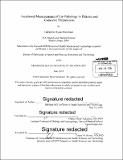| dc.contributor.advisor | Hideko Heidi Nakajima. | en_US |
| dc.contributor.author | Merchant, Gabrielle Ryan | en_US |
| dc.contributor.other | Harvard--MIT Program in Health Sciences and Technology. | en_US |
| dc.date.accessioned | 2014-09-19T21:44:02Z | |
| dc.date.available | 2014-09-19T21:44:02Z | |
| dc.date.copyright | 2014 | en_US |
| dc.date.issued | 2014 | en_US |
| dc.identifier.uri | http://hdl.handle.net/1721.1/90172 | |
| dc.description | Thesis: Ph. D., Harvard-MIT Program in Health Sciences and Technology, 2014. | en_US |
| dc.description | Cataloged from PDF version of thesis. | en_US |
| dc.description | Includes bibliographical references. | en_US |
| dc.description.abstract | This work investigated the utility of reflectance (R), a measure of middle-ear mobility, in the differential diagnosis of pathologies responsible for conductive hearing loss (CHL). Current clinical practice cannot distinguish the multiple pathologies that produce conductive hearing loss in patients with an intact tympanic membrane and a well-aerated middle ear. The lack of a more effective non-surgical diagnostic procedure leads to unnecessary surgery and limits the accuracy of information available during pre-surgical consultations with the patient. A noninvasive measurement to determine the pathology responsible for a conductive hearing loss prior to surgery would be of great value. This work focuses on determining whether a non-invasive diagnostic method, R, is a possible solution to this problem. Reflectance is a measure of the amount of sound that is reflected back when a sound stimulus is played in the ear canal. Measurements of R were made in a large number of patients who had a variety of pathologies that cause CHL including ossicular fixations, disarticulations, and third window disorders in order to explore the clinical utility of R measurements in differentiating these pathologies. Measurements of ossicular motion using laser Doppler vibrometry were also made in the same patients in order to compare the diagnostic utility of this well studied method to that of R. Using this patient information, multiple diagnostic uses and possibilities were explored, which showed the pre-surgical diagnoses of various pathologies. In order to investigate the effects of these pathologies in a controlled and systematic way, R and other metrics of middle-ear performance were also measured in human temporal bone preparations with simulated pathologies similar to those in the patient populations. Reflectance was also measured up to a higher frequency than had previously been possible using an experimental acoustic reflectance measurement system. We then analyzed the extended frequency measurements in novel ways to determine the effects of pathology on the time-domain characteristics. The high-frequency measurements in temporal bones were then used to explore potentially diagnostically useful computational models of middle-ear mechanical function in normal and pathological ears. | en_US |
| dc.description.statementofresponsibility | by Gabrielle Ryan Merchant. | en_US |
| dc.format.extent | 181 pages | en_US |
| dc.language.iso | eng | en_US |
| dc.publisher | Massachusetts Institute of Technology | en_US |
| dc.rights | M.I.T. theses are protected by copyright. They may be viewed from this source for any purpose, but reproduction or distribution in any format is prohibited without written permission. See provided URL for inquiries about permission. | en_US |
| dc.rights.uri | http://dspace.mit.edu/handle/1721.1/7582 | en_US |
| dc.subject | Harvard--MIT Program in Health Sciences and Technology. | en_US |
| dc.title | Functional measurements of ear pathology in patients and cadaveric preparations | en_US |
| dc.type | Thesis | en_US |
| dc.description.degree | Ph. D. | en_US |
| dc.contributor.department | Harvard University--MIT Division of Health Sciences and Technology | |
| dc.identifier.oclc | 890206622 | en_US |
